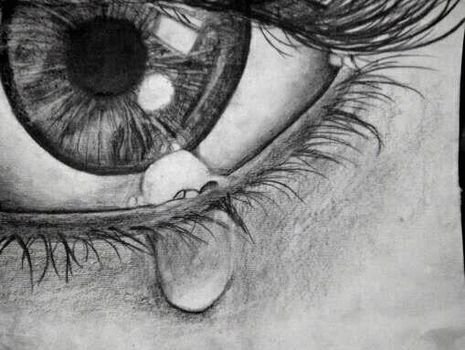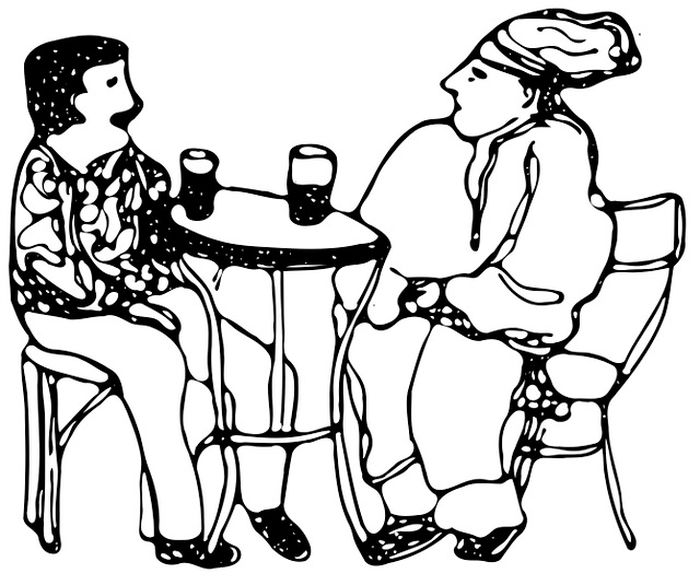Just Drop It: On giving up the chase for further tears
In his ‘Small Comforts’ column Ewan Martin discusses his journey with the art of crying.

I had a couple of tearless years between my GCSEs and the first lockdown. Two years without a drop. Onion eyes aside, the tide was out from shore. I wasn’t lacking reasons to weep; I was fairly informed about the world’s travesties and adept at self-pitying too. I understood as well, in theory, the grievances of the poets, but my eyes never quibbled upon reading them. Thinking myself a stoic, I was proud of my drought’s endurance. If anyone ever died who wasn’t meant to yet, I assumed I’d cry then, but until that happened, I was satisfied not to dabble — keeping dry seemed like the more dignified choice of response. I was smug even, until I realised that my dry spell wasn’t a choice.
“Why couldn’t poetry, books, films, or conversations make me cry if they could make me sad?”
Not a drop, even when I felt sadness whelm invisibly. I’d be carried to the verge, but never see a drop. The tide was out, and I was getting thirsty. Marooned, I began to feel like a bit of a blockhead. Why couldn’t poetry, books, films, or conversations make me cry if they could make me sad? Solidity can be burdensome. I’d press myself, trying to upwell a tear by striking the right chord of thoughts. I’d go for a triad like ‘lost childhood’, plus ‘forgotten grief’, plus ‘everyone’s loneliness’ —or some other equivalent combination — but, although sadness would resonate, I could never seem to find the concoction of miseries required to produce a tear.
In truth, the eye cannot weep while it watches the flood line. Tears must take its flank by surprise.
So, one June night I came upstairs after finishing a movie and, pausing at the threshold of my bedroom, I felt a startling droplet peep. I noticed it; it wriggled free; it was all I mustered, but it was relief distilled. Anyone who’s ever cried after a dry while will know the nostalgia a tear can pique.
I tried to think more about the movie, to touch upon the tragic vein flowing through it, but my sentiments wouldn’t climb. Crying usually happens, or fails to happen, despite our efforts, and despite my efforts I cried no more that night.
Since thawing, I estimate I’ve had my cornea leak on a bi-monthly basis. That’s every two months, not once a fortnight, so I won’t need to invest in a hanky any time soon — and, despite my progress, I’m still hankering for a cry that feels total. I have imagined this ideal state of weeping which will ecstatically discombobulate my common sense, rupture my complacency, dissolve my apathies and perhaps liquefy the rest of me too for good measure. Puddles can’t type, so you know I’m yet to achieve it.
Wading against the stream
In Glasgow they call crying ‘greeting’, and now that’s what I do, I greet my occasional and vague crying urges, embrace them, and try to wade into them. But to pursue a cry is to venture against the current; we may find tributaries, but the source of the river will always lie somewhere further upstream.
How tantalising, that there is always a deeper crying we have failed to reach.
Though a wavering drop falls to oblivion, we can never quite drop with it. Try as we might, we cannot splash; we cannot abandon ourselves utterly to the flood. Rather, the flood abandons us. Each snuffle, wince, and contraction of the throat — each reminder of our physicality — yanks us back from joining the transient translucence of tears.
And yet I find that each cry seems a little clearer, as if, after new experiences and deeper thought, I’m brought a step closer to the source of all tears. This is not to say the source of all of my tears, but rather I mean that aquifer of tragedy which dwells quietly at the centre of every life.
By no means am I a unique crier. I believe we’re all following the same river, and our journey towards a refinement of tears, so daunting, ought to be communal.
Each cry on Earth is informed, however slightly, by the accumulation of tears that have fallen before it, and by whatever else has been tearlessly endured. Through each, the crier peers with a little more clarity beyond the murkiness of the particular moment, and towards that undiscovered source of human tears.
Deep stuff, potentially! But I never get very far myself. It seems that whenever I cry, it must end with the vain anti-climax of looking at my reflection. I just can’t help but wonder what my melting face looks like. Of course, the mirror always shows me to be more solid than I’d expected, and I usually end up laughing at myself for getting so carried away.
Yet part of me always wishes to have been carried further. Our depths can allure us, even as our swimming flounders. Shallower thoughts about the strange sensation, spectacle, and achievement of crying keep me frustratingly afloat.
Boohoo. But phew...
 News / SU stops offering student discounts8 January 2026
News / SU stops offering student discounts8 January 2026 Comment / Plastic pubs: the problem with Cambridge alehouses 5 January 2026
Comment / Plastic pubs: the problem with Cambridge alehouses 5 January 2026 Science / New year, new room, new you8 January 2026
Science / New year, new room, new you8 January 2026 News / Uni-linked firms rank among Cambridgeshire’s largest7 January 2026
News / Uni-linked firms rank among Cambridgeshire’s largest7 January 2026 Comment / What happened to men at Cambridge?31 December 2025
Comment / What happened to men at Cambridge?31 December 2025











